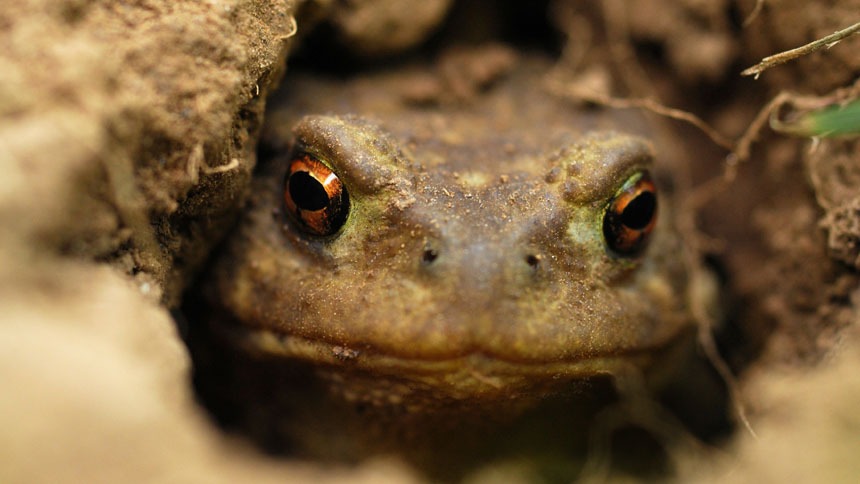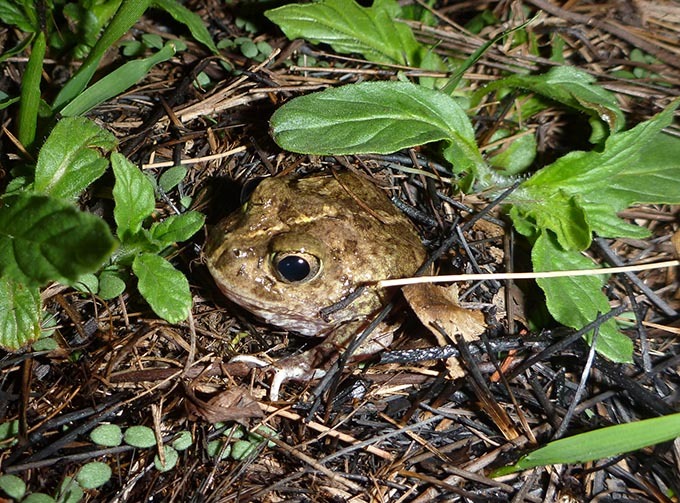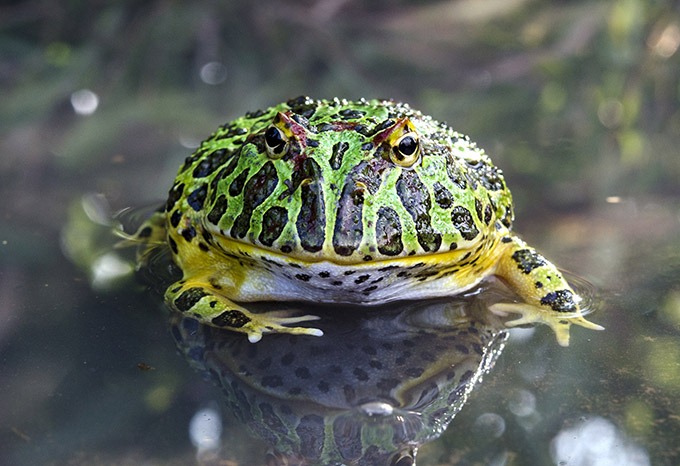
Why Do Frogs Burrow?
Frogs and toads are amazing amphibians, though there isn’t a massive difference between the two. In short, toads and frogs are both part of the Anura order. They have several creative ways of adapting to their environment, and they are found in a range of climates, from the freezing Arctic Circle, to deserts, and rainforests.
Frogs burrow for a variety of reasons, like hibernation (brumation), escaping harsh weather, and to ambush their prey. Read on to find out how frogs burrow to survive all over the world.
Page Contents
Hibernation
Frogs are found in all types of climates and environments in most parts of the United States. Studies suggest that frogs may return to the same hibernation site, called a hibernaculum, every winter. They’re not too choosy about where they hibernate. If you’re a gardener, you might have seen some mysterious looking little holes or indentations in the soil of your garden that were dug by a frog. Frogs also hibernate in fields, forests, and even urban environments.
In rural terrain, terrestrial frogs sometimes use burrows dug by another animal or an ant mound as their own hibernation spot. You can also find them wintering in tree stumps, under rocks or logs, and in some cases, they just burrow as far under the leaf litter as they can. In the urban environment, frogs often find a cracked building foundation and burrow into the crack as far as they can.
Aquatic frogs need to hibernate near water, but they don’t burrow under the mud like other animals, like turtles. Hibernating turtles can slow their metabolism, enabling them to subsist on the oxygen in the mud. Aquatic frogs can’t do this, and therefore cannot breathe under the mud. These frogs usually hibernate only half buried in the mud, with their heads exposed and they sometimes even swim around.
Terrestrial frogs usually die if they spend the winter exposed to the elements. In the Northeast United States, the temperature forces them to burrow underground to hibernate between September and October, and they don’t come out until the following April or May, usually when the temperature rises above 40ºF.

Frogs like to burrow in loose soil, and they don’t burrow prior to hibernation. They enter the burrow as soon as they dig it. They use their hind legs to dig, so they back themselves into the burrow as they dig. As they’re backing in, the opening to the burrow closes and covers their head. The frog curls itself into a ball, like the fetal position, and slows its metabolism, living off stored energy. This state of dormancy is called torpor or a torpid state.
Escaping Harsh Weather
Frogs burrow during the winter to escape harsh weather and to prevent freezing as much as possible. They hibernate in burrows up to 24-inches deep. This puts them below the frost line and keeps them out of the elements.
Frogs that hibernate under rocks or in tree stumps are more susceptible to the cold because they’re more exposed to the elements.
Sometimes these frogs become partially frozen during the winter. They stop breathing, their heart stops beating, and they appear to be dead, but they’re not. These frogs typically survive because water crystallizes in the body cavity and the bladder under their skin. Additionally, they have a large amount of glucose (sugar) stored in their vital organs which works like the antifreeze does in your car. As soon as the hibernation spot thaws, so do the water crystals in the frog, and they slowly spring back to life.
In climates where there is extreme heat, drought conditions, or lack of food, frogs like the African Bullfrog do something similar to hibernation, called estivation. Estivation is when the frog burrows deep underground, leaving only their nostrils exposed so they can breathe. Then, the frog sheds several layers of skin which forms a type of waterproof cocoon enveloping them and protecting them from the elements.
Burrowed in and cocooned, the frogs conserve energy and enter a dormant state. When the heat dissipates or the rains return, they free themselves from their burrow and sometimes eat the cocoon of skin.
Ambush Predators
Not all frogs have long, sticky tongues to wrap around and catch prey. In fact, some frogs don’t even have teeth, so they only eat whatever they can swallow whole. Many frogs are ambush predators. Some, like the Pacman Frogs, use stealth to catch their prey.
They need to get close to their target, and then they grab it in their mouth, bite down, and swallow their prey whole. Others are much sneakier. They burrow into the leaf litter or mud, leaving only their heads exposed. They sit very still and wait until some hapless critter wanders by.
The American Bullfrog, the largest frog in North America, likes to lurk in ponds and streams, partially burrowed into the mud, with their head above the water. They wait patiently for their prey to wander by and then launch themselves toward their victim, mouth open.
The green frog, on the other hand, won’t burrow into the ground like the American Bullfrog. Instead, green frogs lie in wait to ambush their prey along the edges of the water.
Horned frogs are what’s called “sit and wait” ambush predators. They partially bury themselves and wait for their food to wander past them, and then they strike with their powerful jaws. The Surinam Horned Frog is an amphibian (lovingly nicknamed the “Pac Man” frog or the star fingered toad) that has a flat body, rough skin, and markings that make it resemble a leaf. These frogs love muddy river bottoms, marshy areas, or flooded forest floors.
Sometimes they burrow into the mud under the leaf litter, perfectly camouflaged, with only their heads exposed. Without teeth or a tongue, they wait patiently in their burrow. When their prey wanders by, they spring into action, lunging at their prey, and swallowing it whole. When they’re in the water, they float motionless, resembling a leaf floating around.

Conclusion
Frogs are fascinating creatures that can adapt to a range of climates and environments. Burrowing helps frogs stay warm in the winter, cool and hydrated in hot and dry climates, and assists them in the hunt for prey. So, the next time you’re strolling around a lake or walking through a nice, leaf littered forest, and you think you saw something move, you may have seen a burrowed frog in brumation or simply waiting for its next meal.

3 Comments
Where can you catch frogs?
Hi, I have two aquatic frogs who were very active in the first two weeks and then they disappeared. I thought my Bettas had eaten them, then I saw one crawl from underneath the gravel and crawled around a little bit, then disappeared again for awhile. Then I saw one dart to the top come back down and disappeared again. I forgot to mention that they were a mating pair when I bought them.
This is very. Interest .Thank you so much